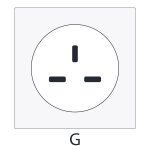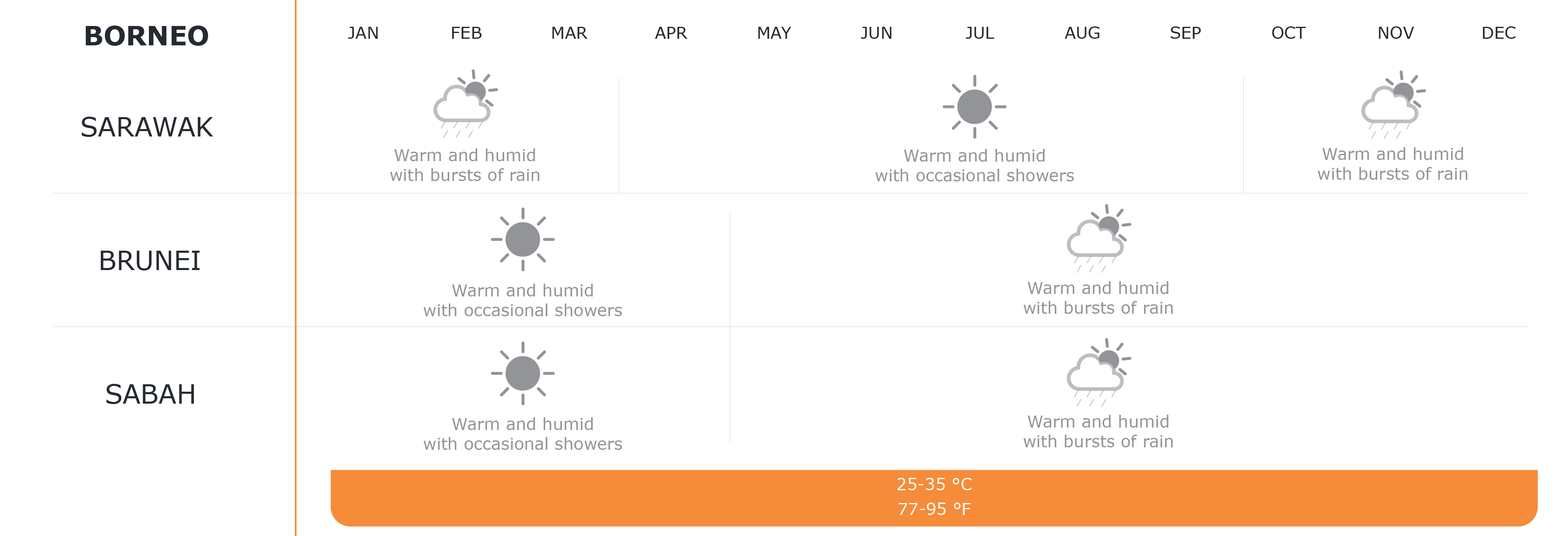Malaysia
Fast Facts
| Visa-free |
|
E-visa |
Travellers that require a visa can submit an application for an e-visa online or contact the nearest Malaysian consulate. For up-to-date details and requirements, visit the website of Malaysia’s Immigration Department. |
Malaysia Digital Arrival Card (MDAC) |
All travellers are required to submit a Malaysia Digital Arrival Card (MDAC) within three days prior to arriving in Malaysia. The form can be completed via the MDAC online portal. A printed copy of the completed form must be presented at the immigration counter upon arrival. |
Documents required on arrival |
|
All the above information may change without prior notice. It remains the traveller’s responsibility to check visa requirements before travelling.
Time zone |
GMT+8 |
Language |
Official language: Bahasa Malaysia Different dialects of Chinese, including Cantonese, Hokkien and Mandarin are also widely spoken and Tamil is spoken by the Indian sector of the population. English widely spoken and understood throughout the country. |
What to pack |
|
Electricity |
The standard voltage in Malaysia is 240V (50Hz).
|
Phone & internet |
A local sim card is easily available at the airport or from a local service provider. An extensive 3G/4G/5G network is in place and covers most urban areas. |
Do |
|
Don’t |
|
Currency |
Official currency of Malaysia: Malaysian ringgit (MYR) The currency is sometimes abbreviated to RM. Foreign currency is rarely used for everyday transactions. Currency can be changed at banks, exchange bureaus and some hotels. ATMs that accept foreign cards are widely available, although harder to find in more remote areas such as islands and beach destinations. |
||||||||
Banking hours |
Usual banking hours are:
|
||||||||
Credit cards |
Credit cards are widely accepted nationwide. | ||||||||
Tipping |
While not compulsory, gratuities are always appreciated in Malaysia. Tipping is not part of the local culture, but many in the travel and service industry are accustomed to receiving a small amount for good service. Please consider the following as a guide to common practice, although tipping and the amount to tip is always at the discretion of the individual.
|
Domestic flights |
Several local and regional airlines offer convenient and fast connections between Malaysia’s major cities. |
Buses |
Peninsular Malaysia has an excellent bus system. Public buses do local runs and a number of privately operated bus companies handle the longer trips. Local and regional buses often operate from one station and long-distance buses from another. The Go KL City Bus in Kuala Lumpur offers free-of-charge rides through the city along famous landmarks, sights, and key transportation hubs. |
Trains |
Peninsular Malaysia has a modern, comfortable and economical railway line that runs from Singapore to Kuala Lumpur and then continues to Butterworth and the border of Thailand. |
Taxis |
Metered taxes are easy to find in the major cities and rides can also be booked via the Grab mobile app or a local equivalent. |
Rickshaws |
This traditional mode of transport can still be found in designated heritage areas of Malaysia, such as Penang and Malacca, and offer a unique way to explore and experience the destination. |
Religion |
Malaysia is a multicultural society with Islam as the dominant religion, with 61 per cent of the population adherents of this faith. The constitution guarantees religious freedom for many other faiths and relations between different religious groups are harmonious and tolerant. Christmas, Chinese New Year and Deepavali have all been declared national holidays alongside Islamic holidays. The large Chinese population practices a mixture of beliefs, with influences from traditional religions followed in China such as Buddhism and Daoism. Hinduism is followed by many of Malaysia’s Indians. Influences from its colonial past will also see many Christians still practicing their religion across the country. |
Food |
Malaysia’s culinary tradition reflects the waves of immigration, settlement and assimilation that brought uniquely delicious flavours from its multicultural Malay, Indian, Chinese and Eurasian population. Primarily consisting of Malay, Chinese and Indian influences, Malaysian cuisine also has its hybrids derived from cross cultural influences such as Mamak (Indian-Muslim) and Nyonya (the Malay-Chinese mix). A Malay meal always revolves around rice, accompanied by curries, fried chicken or fish, vegetable dishes, and small portions of condiments, called sambal.
Common local dishes:
|
Shopping |
Malaysia is a shopper’s paradise; the capital Kuala Lumpur already has well over 20 large malls with most of them concentrated within the “Golden Triangle”, near Bukit Bintang. Shopping malls are usually open throughout the week from 10 am until 10 pm.
Traditional markets, also called wet markets, are a great source for fresh meats, fruits and vegetables, spices and other basic local ingredients. It is best to visit these markets in the early morning to get the freshest produce. Kuala Lumpur, Johor Bahru, Penang and Genting Highlands are the best places for a modern shopping experience while cultural handicrafts can be found in Malacca and the East Coast of Peninsular Malaysia. Langkawi Island, Tioman Island and Labuan Island are duty-free zones that are popular for their alcohol and chocolates. What to buy:
|
Vaccinations |
Proof of yellow fever vaccination is required if you have recently travelled to a country where the disease is present.
There are currently no other vaccine requirements, although it is advisable to be up-to-date with standard inoculations, such as:
Consult your doctor for the most appropriate medical advice. If you require a particular medication, ensure that you pack an adequate supply, as it may not be available locally. Various biting bugs, leeches, parasites and venomous snakes are found in Malaysia’s rugged jungles so use insect repellent, don’t walk barefoot and take sensible precautions to avoid bites and stings if you embark on a jungle adventure. |
Drinking water |
Tap water in the capital of Kuala Lumpur is potable, but most locals prefer bottled or filtered water. Bottled mineral water is easy to find at convenience stores around the country. Ice cubes are typically safe if served at a hotel or restaurant, but best avoided at street stalls and in remote parts of the country. |
Safety |
Malaysia is a safe country to visit. However, it is advisable to take some precautions to safeguard your belongings:
|
Insurance |
Travellers are advised to obtain appropriate insurance to cover any accidents or medical emergencies while travelling. In some cases, treatment will not be administered without proof of travel insurance. Ensure that your plan covers motor vehicle accidents if you plan to hire a car or motorbike. Emergency evacuation cover is highly recommended as you may have to fly out of the country for treatment. |
Emergency numbers |
Call 999 for all emergencies. |
This information was valid at the time of publication and it is subject to change at any time. We cannot be held responsible for any external links. You acknowledge, by your use of this site, that you use it at your own risk and that Asian Trails shall not be liable for any damages of any kind related to your use of this site, or the information contained within. We reserve the right to correct any errors, inaccuracies or omissions and to change or update information at any time without prior notice.




